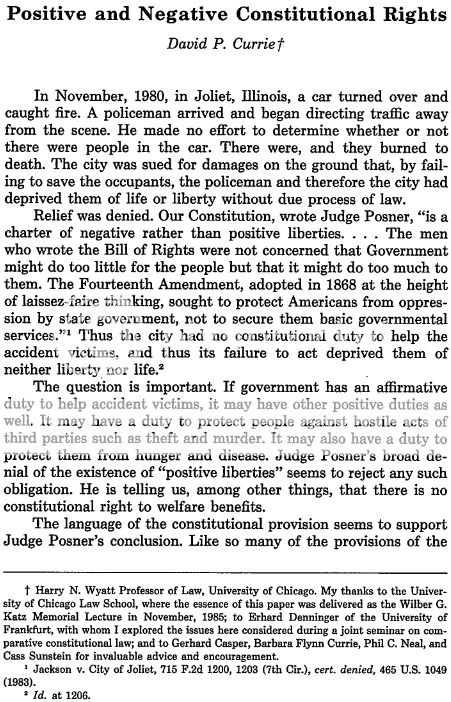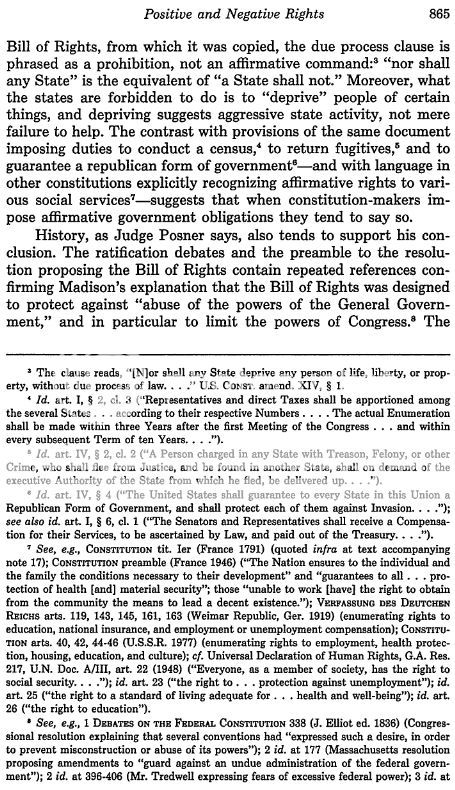KokomoJojo
VIP Member
- Oct 2, 2013
- 2,180
- 185
- 85
This is for those that never really understood the underlying law governing rights, privileges and liberty. That said normally I do not use wiki for a reference but in some cases if its close enough and saves people from ready court cases I post it as a reference. This is one of those cases.
All too often I hear legally ignorant people say "the constitution does not explicitly say you [a person] can do 'xyz' so blah blah blah blah...."
So those who understand the law can now quickly cite this thread to educate others how the american legal system is designed to work.
Granted I realize that you hear that crap in court from asswipe attorneys when they grovel at the judges feet saying any damn thing, lying cheating and stealing, whatever they can get away with to win a case.
Now, that said, explicitly stated positive law is true IF they are talking about the limited 'authority' granted to the government, [in the constitution] which can only be granted by express positive law, or in the same vein 'privileges' granted to people by government, and otherwise is ridiculous if they are referring to rights of 'liberty' of people which in the constitution are categorically reserved to the people as negative law which means people only have and retain liberties they claim. [The government has no obligation to 'give' them to you]
That said here are some distinctions people need to learn before they start throwing around their constitutional opinions.
POSITIVE RIGHTS (usually) require ACTION.
NEGATIVE RIGHTS (usually) require INACTION.
GRANTED 'AUTHORITY', EXPRESSED/LIMITS - JURISIDICTION.
[Authority is by contract and usually positive generally applies to government.]
(note: narrow exceptions ommitted)
The government of the US has no 'legitimate' negative authority.
To take an example involving two parties in a court of law:
Adrian has a negative right to x against Clay if and only if Clay is prohibited from acting upon Adrian in some way regarding x.
In contrast, Adrian has a positive right to x against Clay if and only if Clay is obliged to act upon Adrian in some way regarding x.
A case in point, if Adrian has a negative right to life against Clay, then Clay is required to refrain from killing Adrian; while if Adrian has a positive right to life against Clay, then Clay is required to act as necessary to preserve the life of Adrian.
There is a distinction between 'claim rights' and 'liberty rights'.
A 'claim right' is a right which entails responsibilities, duties, or obligations on other parties regarding the right-holder. [Usually Contract Privileges]
In contrast, a 'liberty right' is a right which does not entail obligations on other parties, but rather only freedom or permission for the right-holder. [Self Declared Right]
[just in case its not clear, in the above context permission = 'self authenticating' for the right-holder]
The distinction between these two senses of "rights" originates in American jurist Wesley Newcomb Hohfeld's analysis thereof in his seminal work Fundamental Legal Conceptions, As Applied in Judicial Reasoning and Other Legal Essays.
Liberty rights and claim rights are the inverse of one another:
a person has a liberty right permitting him to do something only if there is no other person who has a claim right forbidding him from doing so; and
likewise, if a person has a claim right against someone else, that other person's liberty is thus limited.
This is because the deontic concepts of obligation and permission are De Morgan dual; a person is permitted to do all and only the things he is not obliged to refrain from, and obliged to do all and only the things he is not permitted to refrain from.
Claim rights and liberty rights - Wikipedia, the free encyclopedia
Negative and positive rights - Wikipedia, the free encyclopedia
more example:



That said the government has zero nada as in no jurisdiction to regulate speech, arms, religion etc. as these are liberties reserved in the negative outside their purview.
Likewise people can only claim a liberty right to the extent that it does not injure or recklessly endanger another.
The notion by statists that the law is the same or applies the same way regarding the people (individual) as it applies to the states [government] that the people created which is the usual mantra heard out here is patently ridiculous.
Negative rights belong strictly to the people and they can claim anything they like with respect to liberty as long as their actions do not endanger or injure another.
Positive rights respect contracts and expressed rights along with government sponsored privileges.
The government operates under express authority by express positive (particularized) grant from the people. (the government has no rights)

All too often I hear legally ignorant people say "the constitution does not explicitly say you [a person] can do 'xyz' so blah blah blah blah...."
So those who understand the law can now quickly cite this thread to educate others how the american legal system is designed to work.
Granted I realize that you hear that crap in court from asswipe attorneys when they grovel at the judges feet saying any damn thing, lying cheating and stealing, whatever they can get away with to win a case.
Now, that said, explicitly stated positive law is true IF they are talking about the limited 'authority' granted to the government, [in the constitution] which can only be granted by express positive law, or in the same vein 'privileges' granted to people by government, and otherwise is ridiculous if they are referring to rights of 'liberty' of people which in the constitution are categorically reserved to the people as negative law which means people only have and retain liberties they claim. [The government has no obligation to 'give' them to you]
That said here are some distinctions people need to learn before they start throwing around their constitutional opinions.
POSITIVE RIGHTS (usually) require ACTION.
NEGATIVE RIGHTS (usually) require INACTION.
GRANTED 'AUTHORITY', EXPRESSED/LIMITS - JURISIDICTION.
[Authority is by contract and usually positive generally applies to government.]
(note: narrow exceptions ommitted)
The government of the US has no 'legitimate' negative authority.
To take an example involving two parties in a court of law:
Adrian has a negative right to x against Clay if and only if Clay is prohibited from acting upon Adrian in some way regarding x.
In contrast, Adrian has a positive right to x against Clay if and only if Clay is obliged to act upon Adrian in some way regarding x.
A case in point, if Adrian has a negative right to life against Clay, then Clay is required to refrain from killing Adrian; while if Adrian has a positive right to life against Clay, then Clay is required to act as necessary to preserve the life of Adrian.
There is a distinction between 'claim rights' and 'liberty rights'.
A 'claim right' is a right which entails responsibilities, duties, or obligations on other parties regarding the right-holder. [Usually Contract Privileges]
In contrast, a 'liberty right' is a right which does not entail obligations on other parties, but rather only freedom or permission for the right-holder. [Self Declared Right]
[just in case its not clear, in the above context permission = 'self authenticating' for the right-holder]
The distinction between these two senses of "rights" originates in American jurist Wesley Newcomb Hohfeld's analysis thereof in his seminal work Fundamental Legal Conceptions, As Applied in Judicial Reasoning and Other Legal Essays.
Liberty rights and claim rights are the inverse of one another:
a person has a liberty right permitting him to do something only if there is no other person who has a claim right forbidding him from doing so; and
likewise, if a person has a claim right against someone else, that other person's liberty is thus limited.
This is because the deontic concepts of obligation and permission are De Morgan dual; a person is permitted to do all and only the things he is not obliged to refrain from, and obliged to do all and only the things he is not permitted to refrain from.
Claim rights and liberty rights - Wikipedia, the free encyclopedia
Negative and positive rights - Wikipedia, the free encyclopedia
more example:



That said the government has zero nada as in no jurisdiction to regulate speech, arms, religion etc. as these are liberties reserved in the negative outside their purview.
Likewise people can only claim a liberty right to the extent that it does not injure or recklessly endanger another.
The notion by statists that the law is the same or applies the same way regarding the people (individual) as it applies to the states [government] that the people created which is the usual mantra heard out here is patently ridiculous.
Negative rights belong strictly to the people and they can claim anything they like with respect to liberty as long as their actions do not endanger or injure another.
Positive rights respect contracts and expressed rights along with government sponsored privileges.
The government operates under express authority by express positive (particularized) grant from the people. (the government has no rights)

Last edited: